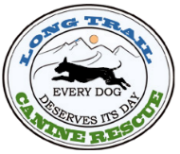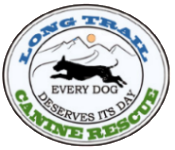 Thinking About Fostering?
Thinking About Fostering?
Long Trail Canine Rescue places homeless dogs temporarily in fosters homes throughout Vermont and New Hampshire while we work to match them with a permanent family. All of our dogs have been spayed and neutered, heartworm tested, dewormed, microchipped, and are current on vaccinations.
If you are interested in becoming a Foster Family, we ask that you read the following information prior to completing our Foster Application to familiarize yourself with our process and what you might expect when bringing a rescue dog into your home. We appreciate your desire to help us by fostering a LTCR dog and our goal is to make the transition from shelter to new home as easy as possible for both foster family and dog.
Why Should I Foster?
Long Trail Canine Rescue (LTCR) does not have a physical shelter to house our rescue dogs while they await adoption. Many of the shelters we rescue from experience extreme overcrowding and lack the resources and room to care for all the homeless animals in their community. Dogs that enter the shelter are given a short window of time to be adopted out or they are euthanized to make room for more animals. Without a network of foster homes to temporarily care for the dogs that we rescue, these deserving pets would not get a second chance to live out a long, happy life with a loving family. Typically dogs are in foster care anywhere from two weeks to a few months. Making sure you are ready to commit your time and home to a rescue dog in need is important to their well being and their future success in their permanent home.
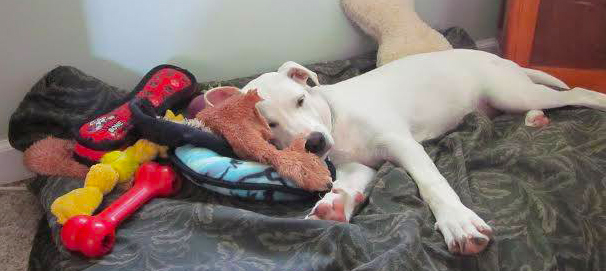 What do Foster Homes Provide?
What do Foster Homes Provide?
Ideally, foster families provide the rescue dog with regular meals, much needed love and attention, and start teaching good manners until a permanent home is found. While in foster care, rescue dogs finally get to experience life in a stable environment, gain some self-confidence, and can recover from any health issues, making them much more attractive to prospective adopters.
LTCR provides foster homes with dog food, toys, leash/collar, blankets, and crates for the foster dogs. Donations from the community allow us to provide these much needed items to our foster homes.
LTCR will be responsible for any necessary medical expenses that may occur while the dog is in foster care. All foster dogs are spayed/neutered prior to adoption. Any necessary veterinary visits will be arranged by the Foster Coordinator. We hope that foster families are able to provide transportation to and from appointments. We encourage our foster families to attend our adoption events with their foster dog. These events are a lot of fun and provide a great opportunity for foster families to show off their rescue dog to potential adopters and to meet our other volunteers.
What Should I Expect from a Rescue Dog?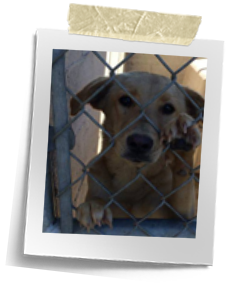
Some dogs entering the shelter may have come from situations where they were starved, neglected and/or abused, while others may be surrendered by families who are moving and cannot take their pets, or simply cannot afford to care for them any longer. In any case, they have experienced varying degrees of stress and change in their lives and will need time to settle into a foster home.
While we have found that most foster dogs adjust rather quickly, others may not sleep through the night at first, they may or may not be house trained, and some may have never experienced living inside a home. We recommend that foster dogs be kept on leash at all times when in an unfenced or unenclosed area. In our experience, any issues can be resolved with a little time, love, and positive reinforcement.
Rest assured, our Volunteers are ready and available to support and guide you every step of the way.
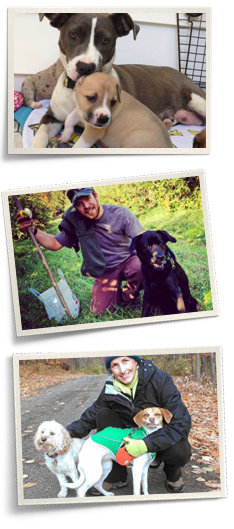 How Will My Foster Dog Find a Home?
How Will My Foster Dog Find a Home?
Anyone seeking to adopt a new family member can find pictures and descriptions of our adoptable dogs through Petfinder, on our Meet Our Dogs webpage, or may meet dogs at one of our adoption events. LTCR requires that anyone interested in adopting must complete our Adoption Application. Potential adopters go through a screening process with our Adoption Coordinator prior to meeting the foster dog. The Adoption Coordinator will schedule a time for the prospective adopter to meet the foster dog at a time convenient for you.
We hope that foster families will accommodate the adoption process by taking time out of their busy schedules to allow potential adopters to meet the foster dog. We encourage foster families to share everything they know about the foster dog with the prospective adopter. The information foster families provide is vital to matching the foster dog with the most suitable, permanent family.
While foster families do not adopt out foster dogs themselves, we are happy to receive adoption referrals. Your feedback on any potential adopter is an important consideration in the adoption process. If you are considering adopting your foster dog, we would discuss any serious applications with you before placing the dog in another home.
How Do I Become a Foster Family?
All potential foster homes start by by completing our Foster Application form. Our Foster Home Coordinator will screen your application and then contact you to review our process, answer any questions you might have, and determine what type of dog would be a good fit in your home based on your living situation and experience.
By welcoming a shelter dog into your home, you are making a huge difference in the life of a dog that deserves a second chance. Fostering is a great way to support animal rescue and can be a rewarding experience, especially knowing you have helped save a life. Your commitment enables us to rescue more dogs from the shelter. Whether you have fostered once or many times for us, or maybe over-nighted a dog in your home during transport from the shelter, we cannot thank you enough for opening your home and heart and truly giving these deserving animals the gift of a better life.
